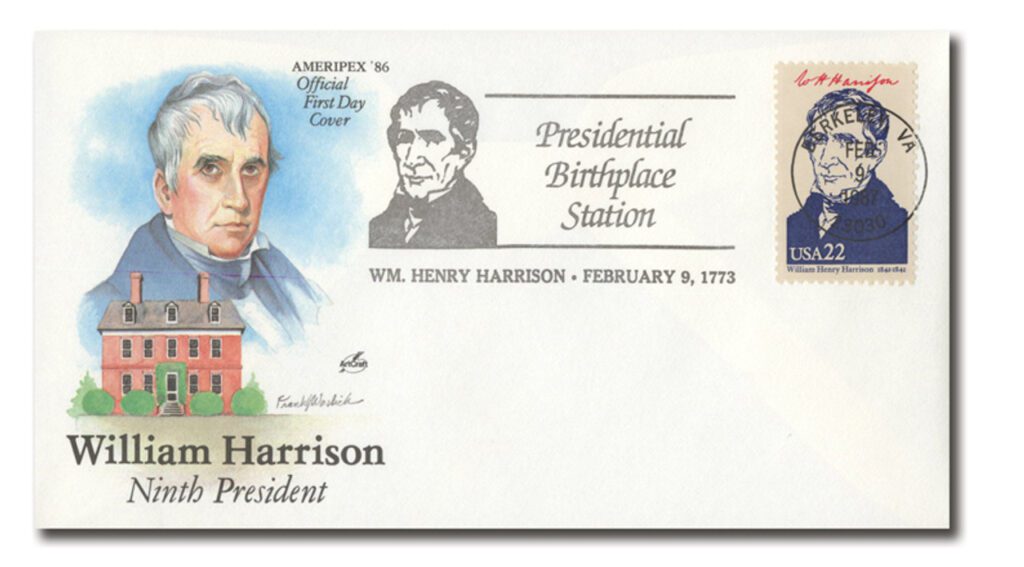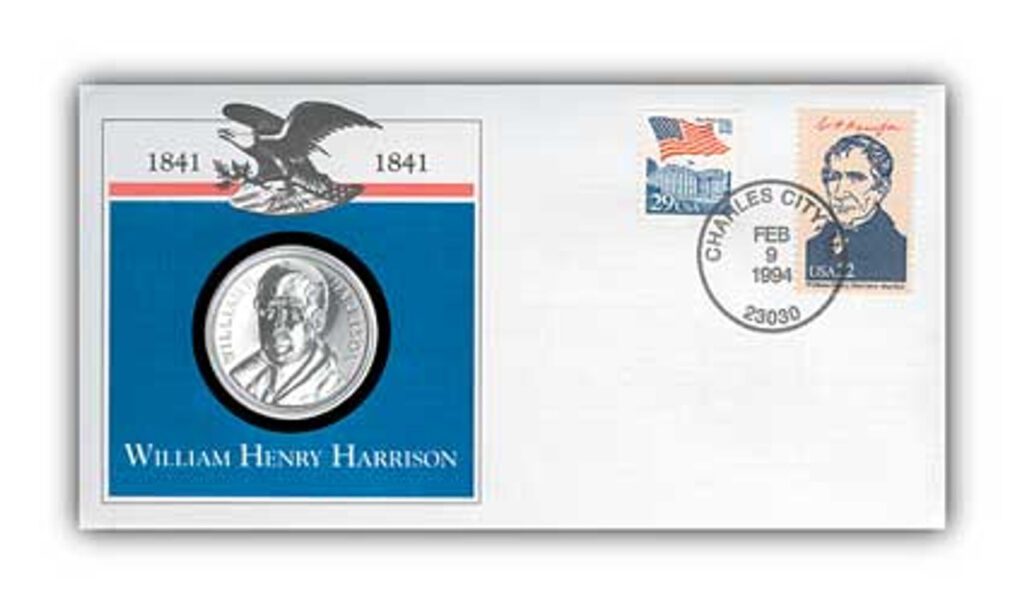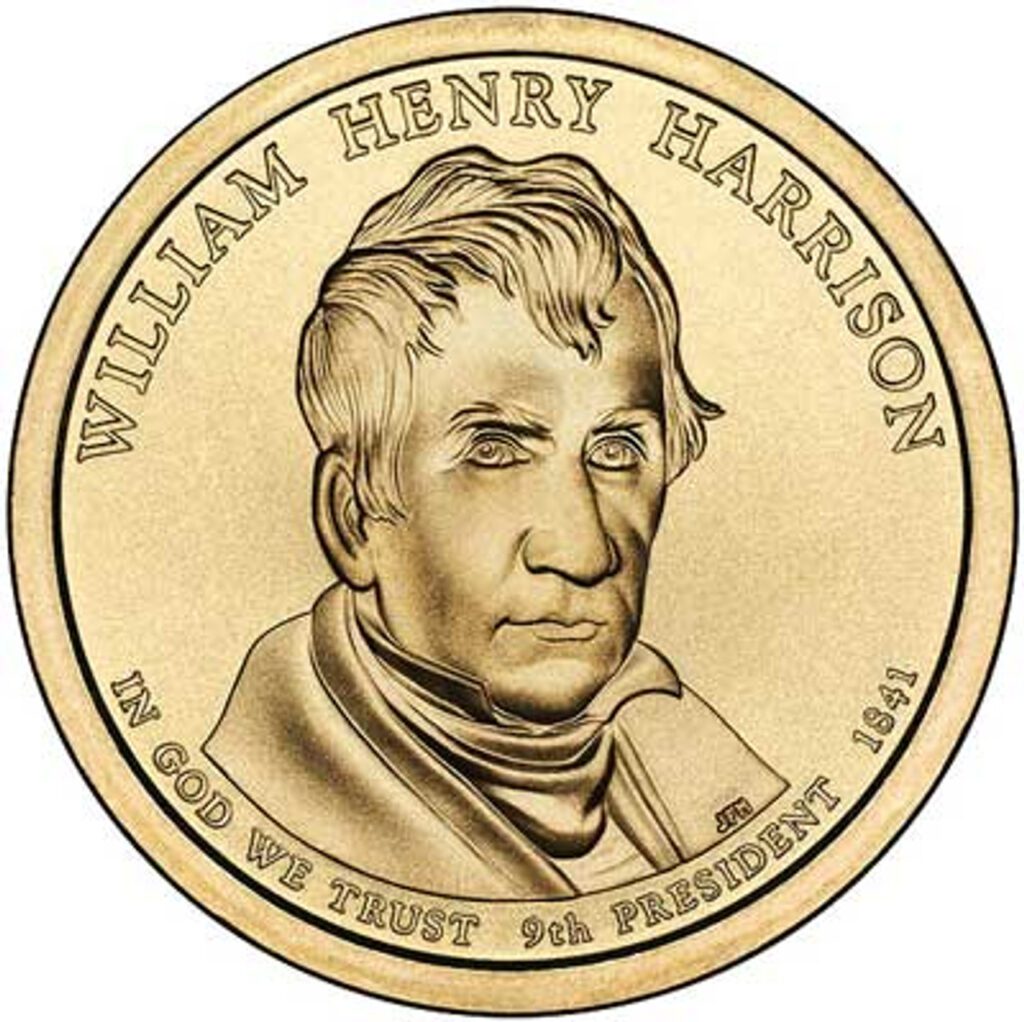William Henry Harrison was born on February 9, 1773, in Charles City County, Virginia.
Harrison was the last American President born a British subject. William’s father, Benjamin Harrison V, was a delegate to the Continental Congress, a signer of the Declaration of Independence, and a governor of Virginia.
When he was 14, Harrison attended Hampden-Sydney College. He then studied medicine at the University of Pennsylvania, a profession he did not like. William had no money for school after his father died in 1791. So Governor Lee, a friend of his father’s, encouraged him to join the army. Within 24 hours, Harrison was commissioned an ensign in the US Army, 11th US Regiment of Infantry.
Harrison began his military career in Cincinnati during the Northwest Indian War. Serving under General “Mad Anthony” Wayne, Harrison was quickly promoted to lieutenant and then aide-de-camp (camp assistant) for his attention to detail and strict discipline. While serving under Wayne, Harrison learned how to command troops on the frontier. Harrison was a key part of the 1794 victory in the Battle of Fallen Timbers, which ended the Northwest Indian War. The following year, Harrison was among the signers of the Treaty of Greenville, which made most of present-day Ohio available to American settlers.

In 1797, Harrison left the army to become secretary of the Northwest Territory, also acting as governor when Governor Arthur St. Clair was unavailable. Two years later, Harrison became the Northwest Territory’s first delegate to the Sixth United States Congress. As a territory delegate (as opposed to a state delegate) Harrison was not permitted to vote on bills, but he could serve on committees, submit legislation, and debate. While in this position, he created the Harrison Land Act, making it easier for settlers to purchase land in the Northwest Territory by selling it in small sections. In 1800, Harrison served on the committee that decided how to divide the Northwest Territory, establishing the Ohio and Indiana Territories.
With the creation of the new territories, President John Adams appointed Harrison governor of the new Indiana Territory. In addition to appointing territory officials and dividing it into districts, Harrison also met with the Native Americans to obtain land for settlement and statehood. Harrison negotiated 13 treaties and acquired more than 60 million acres of land. However, many Native Americans did not accept the treaties, saying they were not negotiated with the leaders who had authority to give away that land. This resulted in high tensions on the new American frontier.

Shawnee brothers Tecumseh and Tenskwatawa (The Prophet) led a resistance movement known as Tecumseh’s War. The brothers convinced their fellow natives the Great Spirit would protect them if they revolted against the white settlers. In 1810, Tecumseh led 400 armed warriors to Vincennes to demand the Treaty of Fort Wayne be repealed. While this meeting ended peacefully, it did not end the unrest. Angered by Harrison’s refusal to return their lands, Tecumseh traveled to find more warriors to battle the US.
While Tecumseh was building up his troops, Harrison received permission from Secretary of War William Eustis to repel the Native American resistance. Harrison and his army of more than 1,000 troops were surprised by an attack by Tecumseh’s warriors on November 6, 1811. Harrison successfully led his troops to victory in the Battle of Tippecanoe, earning the nickname “Old Tippecanoe,” and recognition as a national hero.
Before the battle was over, Tenskwatawa reportedly placed a curse on Harrison, known as “Tecumseh’s Curse.” According to tradition, every US president elected in a year ending with zero (every 20 years) would die in office. Despite the lack of physical evidence of the curse, it appeared to come true for Harrison and the next six zero-year presidents. The pattern was broken by Ronald Reagan, who narrowly survived an assassination attempt early in his term in office.
Harrison served as commander of the Northwest Army as Tecumseh’s War continued and the War of 1812 began. A tough but fair leader, Harrison quickly advanced his troops north to fight the Indians and their new British allies. He recaptured Detroit from the British on his way to Canada and defeated the British at the Battle of the Thames. Following the battle, the secretary of War, with whom Harrison had been in constant conflict, assigned him to an isolated post, giving front line control to one of Harrison’s subordinates. Harrison immediately resigned, feeling that the assignment was “subversive [to] military order and discipline.” After the war, Congress investigated the situation and found that he had been mistreated. Harrison was awarded a gold medal for his service.
President James Madison appointed Harrison to negotiate two treaties with Northwest Native American tribes, obtaining a large amount of land for the US. From there, he served in the US House of Representatives, Ohio State Senate, and US Senate. In his term as senator, Harrison became well known for his passionate debating skills.
In 1828, Harrison was appointed minister to Colombia. Shortly after his arrival, Harrison reported to the US secretary of State that the country was near anarchy and he believed Simón Bolívar was attempting to make himself dictator. Harrison stressed the importance of republicanism to Bolívar. The following year, President Andrew Jackson ordered Harrison’s return to the US.
Upon his return to America, Harrison briefly ran a distillery before returning to public life as a Whig candidate in the election of 1836. Though he lost that election, he ran again in 1840. Harrison’s campaign focused on his impressive military service and blamed the weak US economy on President Martin Van Buren. In retaliation, his opponents depicted Harrison as an old man who would rather “sit in his log cabin drinking cider” than take care of the country. Their plan backfired when Harrison adopted the log cabin and cider images as part of his campaign on banners and posters, and even passed out bottles of hard cider shaped like log cabins. Harrison used this imagery to appeal to the common man, who now viewed him as a simple frontiersman. Additionally, one of Harrison’s campaign slogans was “Tippecanoe and Tyler too,” focusing on his military heroics. Harrison won the Electoral College in a landslide.
Harrison arrived in Washington for his inauguration on March 4, 1841, by train, making him the first president to do so. A cold and windy night, Harrison chose to appear in the parade and give his inaugural address without an overcoat or hat. At 8,444 words, his two-hour inaugural address was the longest in history. He promised to re-establish the Bank of the United States and increase its credit capabilities by issuing paper money. To create a more qualified staff, he intended to depend on the judgment of Congress rather than use his veto power and reverse Jackson’s spoils system.
President Harrison never got to make these changes, dying of pneumonia on April 4, 1841. His last words (likely intended for Vice President John Tyler) were, “Sir, I wish you to understand the true principles of the government. I wish them carried out. I ask nothing more.” He was the first president to die in office and served the shortest term of any president at 30 days, 12 hours, and 32 minutes.
| FREE printable This Day in History album pages Download a PDF of today’s article. Get a binder or other supplies to create your This Day in History album. |
Discover what else happened on This Day in History.










Well done! Concise, yet complete. I knew many of these facts and stories, but have never seen them presented in such a clear and punctual manner.
I had learned a fair amount of this history lesson previously. Tecumseh’s Curse and the banners and posters featuring cider and a log cabin were new to me. Thank you Mystic for a great article!
Longest inaugural speech, shortest presidency! There’s probably a lesson to be learned there, but we’ll keep this brief.
This was a fantastic piece of history. Thank you so much for sharing this.
Fantastic article! Thank you, Mystic.
Interesting history. This president did enjoy talking so it seems.
A lot of us do and we hopefully speak intelligently about what we are talking.
Repetition many times leads to not so happy readers. It pays to keep things in order and proceed fom there.
Thank you for a great history lesson! It seems I appreciate history more now than when I was younger. The stamps featured and other items were appreciated and I plan to purchase some. By the way, I purchased stamps from your company when I was a child–and I am now 65 years old!! Glad to see you are still in business!!
Other points to be made are that the U.S. went the first 52 years (1789-1841) from Washington to Van Buren without losing a President through death or resignation. We haven’t matched that record since. It is also worth mentioning that Harrison’s short tenure points out the need to pick a suitable Vice Presidential candidate. Harrison was a Whig, but his Vice President, John Tyler, was a life-long Democrat. Upon becoming President, Tyler reversed nearly all of Harrison’s and the Whig’s policies. Every member of Harrison’s cabinet except Secretary of State Daniel Webster resigned in protest.
It seems the Democrats are trying to carry on Tyler’s lame traditions. Sad.
That’s a pretty lame comment right there, Frank. Pathetic!
When I came to the event concerning the Battle of Tippecanoe, I remember from my High School American History Course, the phrase: “Tippecanoe and
Tyler Too”. Sure enough there it was, and associated with President Harrison.
Interesting and the history is fascinating. I didn’t care for the use of the term “resistance” pertaining to Native Americans defending their land. And wasn’t there a story about Tecumseh meeting Harrison during one of the treaty meetings and Harrison being a bit intimidated?
If Tyler was honored to be chosen for running mate I would think he would support Harrison if nothing else for unity’s sake. I didn’t know this was part of our history and I’m glad to know about it. So much for partisan politics and working together for the good of our country.
I remember when President Ronald Reagan was shot, one of the news anchors mentioned something referred to as the: “Zero Factor”. I may have heard in the past ie High School, that it started with William H. Harrison.
Thank you, Mystic for mentioning that piece of American History. And it was not Tecumseh, but his brother: Tenskwatawa.
From many historical sources, the European settlement of Ohio and then Indiana was a conquest to remove Native Americans and a breach of prior treaties. It appears inevitable that the two cultures were not able to live peaceably. Many atrocities were committed by both groups. No evidence that Harrison ever promoted them but he, and many others, did not take steps to prevent them.